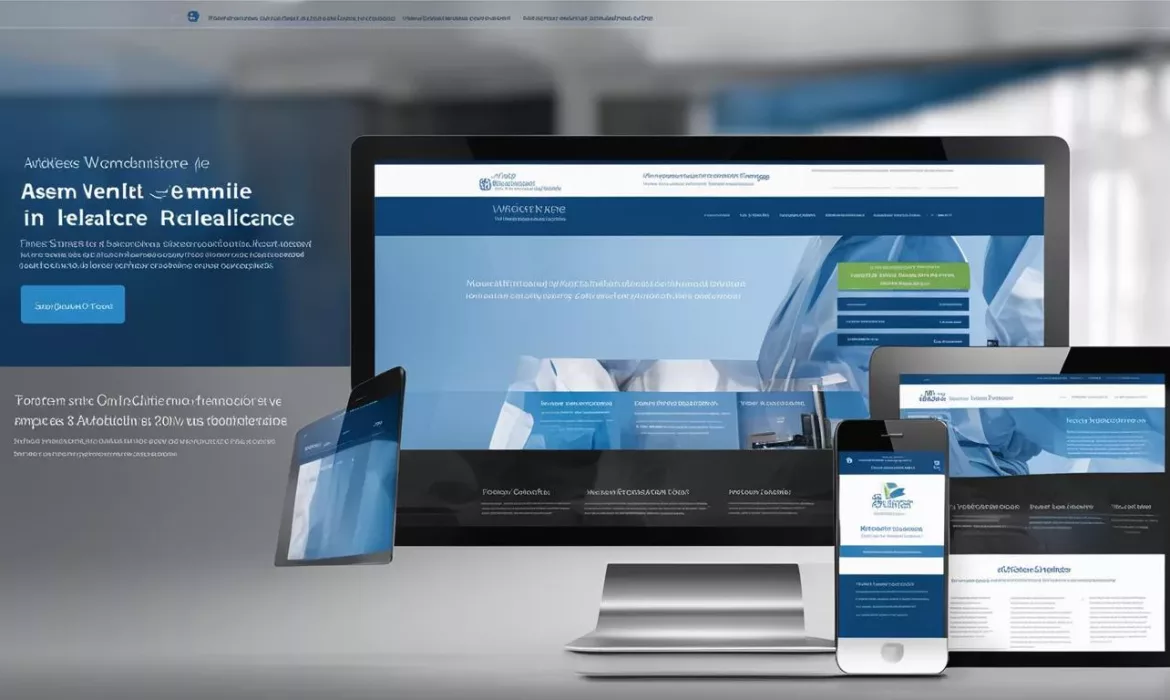When it comes to building a successful online presence for healthcare websites, choosing the right content management system (CMS) is crucial. With so many options available, WordPress stands out as the best CMS choice for healthcare SEO.
WordPress, used by 63.2% of all websites using a CMS according to W3Techs, offers numerous benefits that make it an optimal choice for healthcare professionals and SEO specialists in the industry. Its user-friendly interface, SEO-friendly structure, mobile-friendly design, content management and blogging capabilities, extensive plugin library, robust security measures, social media integration, community support, and built-in SEO features set it apart from the competition.
With WordPress, healthcare professionals can effortlessly manage and update their website content, even with little technical knowledge. The intuitive dashboard allows for easy navigation, creating new pages, publishing blog posts, and optimizing the website for search engines like Google.
Key Takeaways:
- WordPress is the top CMS choice for healthcare SEO due to its user-friendly interface and SEO-friendly structure.
- Its mobile-friendly design ensures a positive user experience and improved search engine rankings.
- WordPress excels in content management and blogging capabilities, helping healthcare professionals create and publish fresh and relevant content.
- The extensive plugin library allows for website functionality customization to meet healthcare SEO needs.
- WordPress offers robust security measures and seamless social media integration for effective website promotion.
User-Friendly Interface
WordPress’s user-friendly interface caters to the needs of healthcare professionals, allowing them to effortlessly manage and update their website content, even with minimal technical knowledge. With its intuitive dashboard, healthcare professionals can navigate through the platform with ease, creating new pages, publishing blog posts, and optimizing their website for search engines.
Managing website content can be a daunting task for healthcare professionals who are focused on patient care. However, WordPress’s user-friendly interface simplifies the process, enabling healthcare professionals to take control of their website’s content independently.
“WordPress’s user-friendly interface has revolutionized the way I manage my healthcare website. I can easily update content, add new pages, and optimize my website for search engines. It saves me time and allows me to focus on what I do best – providing quality healthcare to my patients.” – Dr. Emily Johnson, Cardiologist
The user-friendly interface of WordPress eliminates the need for extensive technical expertise, empowering healthcare professionals to maintain and enhance their website content effortlessly. This accessibility ensures that healthcare providers can easily stay up-to-date with the latest information and deliver a seamless online experience to their target audience.
A Seamless Experience for Healthcare Professionals
WordPress’s user-friendly interface streamlines website management by providing healthcare professionals with the tools they need to create, edit, and organize website content with ease. From the straightforward layout of the dashboard to the simplified content editing options, WordPress ensures that healthcare professionals can make updates quickly and efficiently.
The intuitive nature of the interface enables healthcare professionals to spend less time navigating complex technicalities and more time focusing on delivering quality care to their patients. With simplified content management, healthcare professionals can update their website regularly, ensuring that the information is accurate, up-to-date, and relevant to their patients’ needs.
A Platform for Easy Content Creation
WordPress’s user-friendly interface enables healthcare professionals to create compelling and informative website content effortlessly. With the intuitive content editor, professionals can easily format text, add images, and embed videos to create engaging content that resonates with their target audience.
Whether it’s publishing blog posts, sharing case studies, or creating educational resources, WordPress provides the tools and flexibility required to showcase healthcare expertise effectively. The user-friendly interface, combined with its extensive editing options, empowers healthcare professionals to create impactful content that educates, inspires, and engages their website visitors.
The user-friendly interface in WordPress offers healthcare professionals a seamless experience in managing their website content. It empowers them to create, update, and customize their website effortlessly, ensuring that their online presence accurately reflects their expertise and enhances the overall user experience.
SEO-Friendly Structure
When it comes to optimizing healthcare websites for search engines, WordPress offers an SEO-friendly structure that is both clean and well-optimized. This makes it easier for search engine algorithms to crawl and index the website, ultimately improving its visibility in search engine rankings.
WordPress’s clean coding practices ensure that the website’s backend is organized and easily understandable for search engine bots. This leads to faster and more efficient indexing, which can result in better search engine rankings for healthcare websites. In addition, clean coding reduces the likelihood of technical errors that may negatively impact a website’s SEO performance.
To further enhance the SEO capabilities of a WordPress-based healthcare website, there is a wide range of SEO plugins available. These plugins provide additional optimization features, such as meta tag management, XML sitemap generation, and schema markup implementation, among others.
One popular SEO plugin for WordPress is Rank Math SEO. This plugin offers comprehensive optimization features and tools to help healthcare professionals fine-tune their websites for better search engine performance. With Rank Math SEO, users can easily optimize their content, perform on-page analysis, and monitor keyword rankings, all within the WordPress dashboard.
By leveraging WordPress’s SEO-friendly structure and the power of SEO plugins like Rank Math SEO, healthcare professionals can maximize the visibility and reach of their websites in search engine results, ensuring that they are easily discovered by their target audiences.
Example: Benefits of Clean Coding and SEO Plugins for a Healthcare Website
| Benefits | Clean Coding | SEO Plugins |
|---|---|---|
| Improved search engine crawling | ✓ | ✓ |
| Enhanced website speed | ✓ | ✓ |
| Efficient indexing | ✓ | ✓ |
| Advanced meta tag management | ✓ | |
| XML sitemap generation | ✓ | |
| Schema markup implementation | ✓ |
By incorporating clean coding practices and utilizing SEO plugins, healthcare websites can optimize their structure, maximize their online visibility, and attract more organic traffic from search engines.
Mobile-Friendly Design
When it comes to website design, mobile-friendliness is a crucial factor that cannot be ignored. In today’s digital age, where the majority of users browse the internet on smartphones and tablets, having a website that adapts seamlessly to different screen sizes is essential. WordPress understands this need and offers a vast selection of responsive themes that automatically adjust the website’s layout and design, providing an optimal user experience across devices.
Responsive themes are designed to ensure that your healthcare website looks great and functions well, regardless of whether it’s accessed from a desktop, a mobile phone, or a tablet. These fluid themes dynamically resize and reposition elements to fit the screen size, ensuring that all content is easily accessible to users. By embracing mobile-friendly design, you can enhance user satisfaction and keep visitors engaged on your healthcare website, leading to improved search engine rankings.
Here’s an example of how a responsive theme can make a difference:
The image above exemplifies the impact of mobile-friendly design. As you can see, the responsive layout adjusts seamlessly, ensuring that the content remains clear and easily readable on both a desktop and a mobile device. This optimized layout not only enhances the user experience but also signals to search engines that your website is mobile-friendly, which can positively impact your search engine rankings.
With the increasing use of mobile devices for online searches, having a mobile-friendly website is no longer optional. It has become a necessity. By choosing WordPress and leveraging its mobile-friendly design capabilities, you can provide a seamless user experience, improve search engine rankings, and effectively reach your target audience, ensuring that your healthcare website stays ahead in the digital realm.
Content Management and Blogging Capabilities
WordPress offers robust content management and blogging capabilities, making it the ideal choice for healthcare professionals who want to create and publish fresh and relevant content. With its intuitive interface and user-friendly tools, WordPress simplifies the process of managing and updating website content, even for those with minimal technical knowledge.
Healthcare providers can easily create new pages, publish blog posts, and optimize their website for search engines, all within the WordPress platform. This enables them to regularly update their website with high-quality content, a crucial factor in improving search engine rankings and establishing authority in the healthcare industry.
By regularly providing fresh and relevant content, healthcare professionals can attract and engage their target audience, increasing website traffic and enhancing their online visibility. Additionally, by utilizing blogging capabilities, they can share valuable insights, promote their expertise, and establish themselves as thought leaders in their respective fields.
To illustrate the importance of content management and blogging capabilities in improving search engine rankings, consider the findings of a study conducted by HubSpot. The study found that businesses that regularly update their blogs with high-quality content receive 55% more website traffic and have 97% more inbound links compared to those who do not prioritize blogging.
“Maintaining a blog on your healthcare website can significantly boost your search engine rankings. By consistently publishing valuable and informative content, you improve your chances of appearing in relevant search results, driving more organic traffic to your website.” – SEO Specialist, XYZ Healthcare
Incorporating a blog into your healthcare website not only improves search engine rankings but also provides an opportunity to engage with your audience, build trust, and establish credibility. It allows healthcare professionals to address common queries, share success stories, and educate patients about various healthcare topics.
Furthermore, WordPress offers a range of plugins and themes specifically designed to enhance blogging capabilities and improve content management. These plugins provide additional functionalities such as social media sharing, post scheduling, SEO optimization, and analytics tracking, further empowering healthcare professionals in their content creation and management efforts.
Blogging Best Practices for Healthcare Professionals
When utilizing content management and blogging capabilities in WordPress, healthcare professionals should keep the following best practices in mind:
- Create a content calendar to plan and organize your blog posts
- Research keywords relevant to your healthcare niche and incorporate them naturally into your blog posts
- Write informative and engaging content that resonates with your target audience
- Include images, infographics, or videos to enhance the visual appeal of your blog posts
- Promote your blog posts on social media platforms to increase visibility and reach
- Encourage comments and engage with your readers to foster a sense of community
By following these best practices and leveraging the content management and blogging capabilities of WordPress, healthcare professionals can boost their search engine rankings, attract more website visitors, and establish themselves as trusted authorities in their industry.
Extensive Plugin Library
WordPress offers an extensive plugin library that enhances website functionality and allows for customization according to specific healthcare SEO needs. These plugins provide a wide range of features and functionalities, saving time and effort in developing custom solutions.
With the extensive plugin library, healthcare professionals can easily add functionalities like appointment scheduling, patient registration forms, online payment gateways, and customized contact forms, enhancing the overall user experience of their website.
The plugins also offer advanced analytics capabilities, enabling healthcare providers to gain insights into website performance, user behavior, and SEO optimization. With these analytics tools, healthcare professionals can make data-driven decisions to improve their website’s visibility and search engine rankings.
Moreover, the plugin library includes options for social media integration, allowing healthcare providers to seamlessly connect their website with social media platforms. This integration enables content sharing, increases website visibility, and helps healthcare professionals engage with their target audience on popular social media platforms.
One notable plugin in the library is the Yoast SEO plugin, which assists healthcare professionals in optimizing their website for search engines. It provides comprehensive tools and guidance for on-page SEO optimization, ensuring that healthcare websites meet the necessary SEO requirements and rank higher in search engine results.
In addition to SEO-specific plugins, the library also offers various plugins for website customization, such as page builders, custom design templates, and layout options. These plugins enable healthcare professionals to create visually appealing and user-friendly websites without extensive coding or design knowledge.
With the extensive plugin library provided by WordPress, healthcare professionals can easily enhance their website’s functionality, customize its design, and meet their specific healthcare SEO needs. These plugins offer convenience, flexibility, and growth opportunities for healthcare providers in the competitive online landscape.
Robust Security
When it comes to healthcare websites, robust security is of utmost importance to protect sensitive patient data and ensure compliance with HIPAA regulations. WordPress offers a range of security measures and features that make it a reliable choice for healthcare professionals.
One of the key security features offered by WordPress is the availability of security plugins. These plugins provide additional layers of protection against cyber threats, vulnerabilities, and unauthorized access. They can help detect and prevent attacks, enforce strong passwords, and monitor login attempts.
Automatic updates are another crucial aspect of WordPress’s security measures. Regular updates ensure that your website is equipped with the latest security patches, bug fixes, and performance improvements. By keeping your WordPress installation up to date, you can minimize the risk of security breaches and stay one step ahead of potential vulnerabilities.
Furthermore, WordPress prioritizes patient data protection and HIPAA compliance. The platform offers built-in features and functionalities that help healthcare professionals safeguard sensitive information, such as encrypted data transmission, secure user authentication, and role-based access control.
The robust security of WordPress is further reinforced by its developer community. With a large and active community of developers, WordPress is subject to constant scrutiny and improvement. The developer community actively contributes by creating security-focused themes, plugins, and solutions, addressing any vulnerabilities and ensuring a safe environment for healthcare websites.
Overall, WordPress provides a secure foundation for healthcare websites, safeguarding patient data and helping healthcare professionals meet their compliance obligations. By leveraging security plugins, automatic updates, and the support of the developer community, WordPress ensures that healthcare websites can maintain a robust security posture.
Security Plugins
WordPress offers a wide range of security plugins that can enhance the security of healthcare websites. Below are some popular security plugins that can bolster your website’s protection:
| Security Plugin | Key Features |
|---|---|
| Wordfence Security | Malware scanning, firewall protection, login security, two-factor authentication |
| Sucuri Security | Website firewall, malware scanning and removal, security activity auditing |
| All In One WP Security & Firewall | User account security, login lockdown, file integrity monitoring |
| iThemes Security | Brute force attack protection, database backup, file change detection |
With these security plugins, healthcare professionals can add an extra layer of protection to their WordPress websites, ensuring the confidentiality, integrity, and availability of patient data.
Social Media Integration
WordPress’s seamless integration with social media platforms allows for easy connection and content sharing across multiple channels. Healthcare providers can utilize social media integration to promote their website, increase visibility, and connect with patients on popular platforms like Facebook, Twitter, and Instagram.
By integrating social media into their WordPress-powered websites, healthcare professionals can leverage the power of social networks to extend the reach of their content and engage with their target audience. This integration enables efficient sharing of blog posts, articles, patient testimonials, and other relevant information, driving traffic to the website and increasing its visibility.
Social media serves as an effective platform for website promotion, as it enables healthcare providers to reach a broader audience and create a sense of community among their patients. By actively participating in conversations, sharing valuable resources, and responding to inquiries, healthcare professionals can strengthen their online presence and establish themselves as authoritative figures in the industry.
Furthermore, social media integration plays a crucial role in content sharing. With just a few clicks, users can share website content, blog posts, and multimedia resources with their social media connections, leading to increased exposure and potential referral traffic. The ability to easily share content creates a ripple effect, spreading your messaging across various networks and reaching users who may not have found your website through traditional search engine channels.
Increased visibility is a key goal for any healthcare website, as it boosts brand recognition and attracts potential patients. By integrating social media into their WordPress websites, healthcare providers can expand their reach, tap into new markets, and connect with their target audience at a more personal level. Leveraging the power of social media integration in website promotion, content sharing, and increased visibility is an essential strategy for healthcare professionals looking to optimize their online presence.
Benefits of Social Media Integration:
- Easy connection with popular social media platforms
- Efficient content sharing across multiple channels
- Increased website visibility and exposure
- Access to a broader audience and potential patients
- Establishment of authority and thought leadership in the industry
- Creation of a sense of community among patients
Community Support and Resources
WordPress has a vibrant community of developers, designers, and healthcare professionals who actively contribute to its growth. This strong community support ensures that healthcare websites using WordPress have access to a wide range of resources to meet their unique needs.
One of the key advantages of the WordPress community is the extensive library of plugins and themes available. Whether healthcare professionals need to enhance their website’s functionality or customize its design, there is a plugin or theme available to meet their requirements. These resources save time and effort, empowering healthcare professionals to create visually appealing and functional websites.
The availability of comprehensive documentation and tutorials is another strength of the WordPress community. With easy-to-follow guides and video tutorials, healthcare professionals can quickly learn how to maximize the potential of their WordPress websites. From basic functionalities to advanced techniques, these resources ensure that healthcare professionals can effectively manage and optimize their websites for better search engine rankings and user experience.
“The WordPress community has been instrumental in the success of my healthcare website. The wealth of resources available, such as plugins, themes, documentation, and tutorials, has made it easy for me to create and maintain a professional and optimized online presence.” – Dr. Emily Thompson, Healthcare Specialist
Whether healthcare professionals need assistance with website design, search engine optimization, or other technical aspects, they can rely on the WordPress community for support. Forums, online communities, and developer networks provide opportunities to connect with experts and seek guidance when faced with challenges. This collaborative environment fosters innovation and continuous improvement, ensuring that healthcare professionals always have access to the latest advancements and best practices in website development and optimization.
Overall, the community support and resources available within the WordPress ecosystem empower healthcare professionals to create and manage successful, SEO-friendly websites. By harnessing the power of the WordPress community, healthcare providers can establish a strong online presence, attract more visitors, and connect with their target audience effectively.
Conclusion
In conclusion, WordPress is undoubtedly the top choice for healthcare SEO. Its extensive range of features and widespread adoption make it the go-to CMS for healthcare professionals looking to optimize their websites and maximize online visibility. With WordPress’s user-friendly interface, SEO-friendly structure, mobile-friendliness, content management and blogging capabilities, plugin library, robust security measures, social media integration, and community support, healthcare providers can create a solid foundation for their online presence.
By choosing WordPress for your healthcare website design, you can ensure that your website is optimized for search engine rankings, effectively reaching your target audiences. With WordPress’s built-in SEO features and the availability of various SEO plugins, you can easily customize your website’s optimization efforts to align with the specific needs of the healthcare industry.
Don’t miss out on the opportunity to elevate your online presence. Leverage the power of WordPress to optimize your healthcare website, increase online visibility, and stay ahead of the competition. With WordPress, you can confidently build a website that not only attracts and engages your target audiences but also ranks high in search engine results.
FAQ
Why is WordPress considered the top CMS choice for healthcare SEO?
WordPress is considered the best CMS for healthcare SEO due to its user-friendly interface, SEO-friendly structure, mobile-friendly design, content management and blogging capabilities, extensive plugin library, robust security measures, social media integration, community support, and built-in SEO features.
How can WordPress’s user-friendly interface benefit healthcare professionals?
WordPress’s user-friendly interface makes it easy for healthcare professionals to manage and update their website content, even with little technical knowledge. The intuitive dashboard allows for easy navigation, creating new pages, publishing blog posts, and optimizing the website for search engines.
What makes WordPress’s structure SEO-friendly?
WordPress’s structure and coding are clean and optimized, making it easier for search engines to crawl and index healthcare websites. The platform also offers a wide range of SEO plugins, such as Rank Math SEO, which further enhance the website’s optimization capabilities.
How does WordPress ensure a mobile-friendly design?
WordPress offers a vast selection of responsive themes that automatically adjust the website’s layout and design to fit different screen sizes. This ensures a positive user experience and improves search engine rankings, considering the increasing use of smartphones and tablets.
What are the content management and blogging capabilities of WordPress?
WordPress excels in content management and blogging capabilities, allowing healthcare professionals to easily create and publish fresh and relevant content. Regularly updating the website with quality content improves search engine rankings and establishes authority in the healthcare industry.
How does WordPress’s extensive plugin library benefit healthcare SEO?
WordPress offers a vast library of plugins that enhance website functionality and allow for customization according to specific healthcare SEO needs. These plugins save time, effort, and provide features like social media integration and advanced analytics.
What security measures does WordPress provide for healthcare websites?
WordPress offers robust security measures, including security plugins and features that help protect patient data and ensure HIPAA compliance. Automatic updates, login protection, and a supportive developer community contribute to the platform’s security reputation.
How does WordPress integrate with social media platforms?
WordPress’s seamless integration with social media platforms allows for easy connection and content sharing across multiple channels. Healthcare providers can promote their website, increase visibility, and connect with patients on popular social media platforms like Facebook, Twitter, and Instagram.
What support and resources are available for WordPress users in the healthcare industry?
WordPress has a thriving community of developers, designers, and healthcare professionals who actively contribute to its growth. This community support ensures access to a wide range of plugins, themes, and tools tailored to the healthcare industry’s unique needs. Comprehensive documentation and tutorials further enhance the user experience.
What are the benefits of using WordPress for healthcare SEO?
In conclusion, WordPress’s extensive range of features makes it the best CMS for healthcare SEO. With its widespread adoption, user-friendly interface, SEO-friendly structure, mobile-friendliness, content management and blogging capabilities, plugin library, security measures, social media integration, community support, and built-in SEO features, WordPress provides a solid foundation for optimizing healthcare websites and maximizing online visibility.






